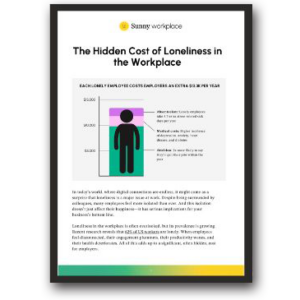
The staggering toll of workplace loneliness on productivity and health
The workplace loneliness struggle is real – for both employers and their employees. It affects everything from productivity and profits to mental health and social well-being. Remote and hybrid work models brought about flexibility and independence. And that’s a great thing (one we highly support at Sunny!). But, that independence has, in turn, increased the potential for feelings of isolation among employees, leading to costly consequences for all parties.
Fortunately, with the right support and resources, even geographically distributed teams can stay meaningfully connected and thrive. This article delves into the staggering statistics surrounding workplace loneliness and its effects on well-being and productivity, but also offers practical strategies for organizations to address this growing concern. It’s not meant to be all gloom and doom, but rather shine a spotlight on the importance of connection in the workplace.
What is loneliness?
Loneliness is a complex and deeply personal feeling, characterized by a sense of isolation and a lack of meaningful connections. It arises when there’s a gap between the social relationships you want and those you actually have. In the workplace, loneliness might look like feeling left out of team activities, lacking close connections with colleagues, or feeling unsupported by leadership.
The impact of loneliness on employees
Loneliness at work isn’t just an emotional challenge; it has real, measurable effects on employees’ health and their ability to perform. Here are some key statistics that highlight the serious consequences of loneliness:
1. Increased risk of turnover
A survey by EY found that 46% of workers are likely to leave a job due to feelings of loneliness. This number is even higher among younger employees, with 54% of Generation Z and 52% of Millennials considering quitting if they felt lonely at work . Organizations that overlook loneliness may face higher turnover rates, particularly among their younger workforce.
2. Decline in mental and physical health
Loneliness is linked to numerous mental and physical health issues, including depression, anxiety, and heart disease. Studies have shown that loneliness can be as harmful to health as smoking 15 cigarettes a day. The emotional and physical toll of loneliness can weaken the immune system, making employees more prone to illness, which in turn increases absenteeism.
3. Decreased productivity and engagement
Employees who feel lonely are less engaged and less productive. Research from BetterUp indicates that even a single incident of micro-exclusion can cause a 25% drop in an individual’s performance on a team project . When employees feel isolated, their motivation dwindles, leading to lower efficiency and creativity.
4. Impact on team dynamics and collaboration
Workplace loneliness doesn’t just affect individuals; it can disrupt team dynamics. Teams that lack strong social bonds often struggle with cohesion, and members may be less willing to collaborate. High-performing teams, by contrast, typically have strong social connections and a sense of belonging. Employees who feel they belong at work are 75 times more likely to be fully engaged compared to those who feel disconnected.
5. Higher turnover and associated costs
The financial impact of workplace loneliness is substantial. Companies that fail to cultivate a sense of belonging may see a 50% increase in turnover risk. For a 10,000-person company, the resulting productivity losses due to turnover can exceed $52 million annually . These figures highlight the importance of tackling loneliness not only for employee well-being but for the financial health of the organization as well.
How an organization can combat workplace loneliness
Addressing workplace loneliness requires a holistic approach that includes both organizational initiatives and individual actions. Here are some strategies organizations can implement:
1. Foster a culture of belonging
Building an inclusive and supportive work environment is essential for combating loneliness. Organizations should actively nurture a culture of belonging where every employee feels valued and connected. This can be achieved through regular high-quality team-building activities, open communication, and inclusive decision-making processes.
2. Encourage social interactions
Promoting social interaction, whether through virtual coffee breaks for remote teams or in-person gatherings for office-based teams, can help strengthen connections. Social events, employee resource groups, and collaborative projects are excellent ways to bring employees together and reduce feelings of isolation.
3. Provide integrated social and mental health support
True wellness happens in community. Given the strong link between loneliness and mental health challenges, organizations should offer comprehensive mental health support alongside opportunities to be social and feel successful. This includes access to counseling services, mental health training for managers, and promoting work-life balance with space for both professional and personal relationship-building. Ensuring that employees have the resources they need to manage stress and maintain their mental health is crucial in mitigating the effects of loneliness.
4. Implement mentorship and buddy programs
Pairing new hires with mentors or buddies can help them integrate into the company culture more easily and form meaningful relationships from the outset. Mentorship programs also provide ongoing support and guidance, helping employees feel more connected and less isolated.
5. Leverage technology for connection
For remote and hybrid teams, technology can be a lifeline for fostering connection. Organizations should invest in digital tools that facilitate communication and collaboration, such as instant messaging platforms, video conferencing, and virtual team-building activities. Ensuring that employees can easily connect with one another, regardless of location, helps maintain a sense of community.
6. Recognize and reward social initiatives
Acknowledging and rewarding employees who contribute to a positive social environment can inspire others to engage more with their peers. Programs like “Friend of the Month” or team collaboration awards not only celebrate those who foster connections but also emphasize the importance of social interactions in the workplace.
The need for immediate action
The statistics on workplace loneliness are a powerful reminder that even great organizations need connection to thrive. As remote and hybrid work becomes increasingly common, the need to address workplace loneliness is more pressing than ever. Not only does loneliness undermine employees’ health and well-being – it has a significant impact on a company’s productivity, engagement, and retention. And when employees feel they must solve their social and mental health challenges in isolation, the problem is compounded.
But, by fostering a culture of belonging, promoting social well-being, and providing the necessary support for meaningful interactions, organizations can unlock a more connected and resilient workforce.



